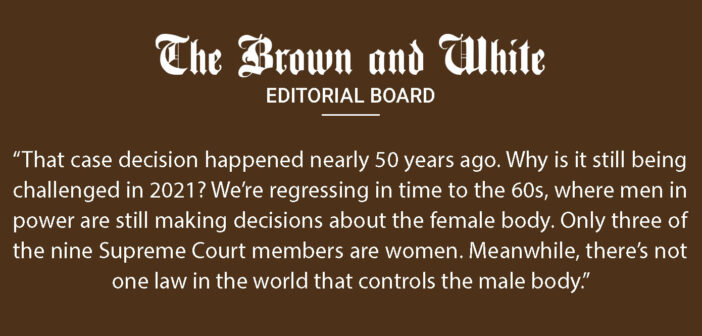The Supreme Court decision of Roe v. Wade in 1973 was monumental for women’s rights.
It was ruled in favor of “Jane Roe,” protecting a pregnant woman’s right to privacy under the 14th amendment, to choose to have an abortion without excessive government restriction.
What is deemed “excessive?”
Earlier this year, Republican Gov. Greg Abbott of Texas signed Senate Bill 8 into law, which bans abortions once a fetal heartbeat is detected — typically, no later than six weeks.
This newly signed law gets past this standard—“without excessive government restriction,”—as the power to uphold this law is not in the hands of enforcement, but instead in the hands of Texas citizens. Texans can sue abortion providers or anyone who aids an abortion that occurs after those six weeks of pregnancy.
The Supreme Court shot down a request to block the bill and the Texas law went into effect on Sept. 1.
Moving forward, this loophole law opens up as a universal law, available for other states to enact.
Currently in Pennsylvania, women aren’t permitted to carry out an abortion after 24 weeks (or after the second trimester).
Pennsylvania legislative leaders advanced several abortion laws in the past, one of which included a six-week ban similar to what was recently carried out in Texas.
This law did not pass because of a veto from Democratic Gov. Tom Wolf, who said that he “will veto any anti-choice legislation that lands on my desk.”
For now, Pennsylvania is safe from anything near the six-week ban being signed into law. But not for long, potentially.
With the gubernatorial race in 2022, the possibility of a new governor who supports such a ban being elected exists.
For instance, Pennsylvania State Sen. Doug Mastrianois is likely to run for governor.
He expressed his support for the Texas six-week ban, and said he was “very excited and happy” that the Supreme Court declined to block the bill.
This Texas law passed simply because of a loophole, barely slipping by the Supreme Court to remain constitutional. Because of this loophole, this ban may spread to other U.S. states.
Perhaps it’s not technically “excessive government restriction,” but the backbone of the Roe v. Wade’s decision regards pregnant women’s rights. The backbone was for women to not have extreme limits on what they can do with their bodies.
That case decision happened nearly 50 years ago. Why is it still being challenged in 2021?
We’re regressing in time to the 60s, where men in power are still making decisions about the female body. Only three of the nine Supreme Court members are women.
Meanwhile, there’s not one law in the world that controls the male body.
Six weeks is simply not enough time for most women to find out they are pregnant. It’s one missed period, plus a week or so.
If a woman isn’t ready to support a child, how is this a reasonable amount of time for her to schedule and follow through with an abortion?
This is no longer about the life and well-being of an unborn child. This law is about forcing an option on women to give birth and support a child, regardless of the circumstances.
It doesn’t matter whether a woman was raped. Whether a woman is financially unstable. Whether a woman isn’t in the right place to raise a child. There are no exceptions to the law, unless there’s a possibility that a woman could die from giving birth.
This law was created to rip the choice away from a woman — a direct violation of her rights.
We haven’t come a long way, but instead, just full circle. While the restriction isn’t a government restriction, it is excessive. Texas women no longer have the right to a choice.
This is a ban that will spread across the country, fast. Women’s rights are being torn away as we speak.






Comment policy
Comments posted to The Brown and White website are reviewed by a moderator before being approved. Incendiary speech or harassing language, including comments targeted at individuals, may be deemed unacceptable and not published. Spam and other soliciting will also be declined.
The Brown and White also reserves the right to not publish entirely anonymous comments.
1 Comment
The embryo protection law in force as of January 1, 1991, defines the beginning of life in a medical sense, to wit, the embryo is the fertilized egg cell capable of development already from the time of fertilization. What are the rights of a developing human? How does this right relate to a mother’s right of “choice”? This was not determined. Just as in many other cases the government kicks the can down the road.
“That case decision happened nearly 50 years ago. Why is it still being challenged in 2021?”; because it was a decision that did not solve the problem at hand. Congress was unwilling/unable to craft a solution so the liberal court made a stab at it. The problem didn’t die.
The Texas legislators came up with a bad law to suit the supposed majority of their voters. Perhaps some entity at Lehigh can find a working solution to the rights and responsibilities of those involved in “problem” pregnancies.
“This law was created to rip the choice away from a woman — a direct violation of her rights.” i think you assume that the crafters of this law have written it because they hate women. That seems like a childish rant for a child does not get what it wants. A good argument is: I want people to care as much for the mother as they care for the fetus. All parties in “problem” pregnancies need to consider responsibilities as well as rights.
Our government has a compelling interest in having citizens who are responsible. That variety of citizen is seemingly a rare breed.
This “choice” for the mother is death for a human life, the reason should be compelling.